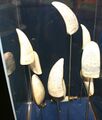Template:Selected anniversaries/April 11: Difference between revisions
No edit summary |
No edit summary |
||
| Line 10: | Line 10: | ||
File:Jean-André Lepaute.jpg|link=Jean-André Lepaute (nonfiction)|1789: Clockmaker [[Jean-André Lepaute (nonfiction)|Jean-André Lepaute]] dies. He was an innovator, introducing numerous improvements in clockmaking, especially his pin-wheel escapement, and his clockworks in which the gears are all in the horizontal plane. | File:Jean-André Lepaute.jpg|link=Jean-André Lepaute (nonfiction)|1789: Clockmaker [[Jean-André Lepaute (nonfiction)|Jean-André Lepaute]] dies. He was an innovator, introducing numerous improvements in clockmaking, especially his pin-wheel escapement, and his clockworks in which the gears are all in the horizontal plane. | ||
File:Macedonio_Melloni.jpg|link=Macedonio Melloni (nonfiction)|1798: Physicist and academic [[Macedonio Melloni (nonfiction)|Macedonio Melloni]] born. Melloni will demonstrate that radiant heat has physical properties similar to those of light. | |||
||1804: Otto Linné Erdmann born ... chemist and academic. He is best known for his work on nickel and indigo and other dye-stuffs. With R. F. Marchand (1813–1850) he also carried out a number of determinations of atomic weights. Pic. | ||1804: Otto Linné Erdmann born ... chemist and academic. He is best known for his work on nickel and indigo and other dye-stuffs. With R. F. Marchand (1813–1850) he also carried out a number of determinations of atomic weights. Pic. | ||
Revision as of 03:46, 11 April 2021
1789: Clockmaker Jean-André Lepaute dies. He was an innovator, introducing numerous improvements in clockmaking, especially his pin-wheel escapement, and his clockworks in which the gears are all in the horizontal plane.
1798: Physicist and academic Macedonio Melloni born. Melloni will demonstrate that radiant heat has physical properties similar to those of light.
1913: Physicist, inventor, and crime-fighter Nikola Tesla uses polyphase alternating current technology to detect and prevent crimes against physical constants.
1914: Mathematician Dorothy Lewis Bernstein born. She will be the first woman to be elected president of the Mathematics Association of America.
1923: Outbreak of Scrimshaw abuse in Seattle and Portland blamed on new class of crimes against mathematical constants.
1955: The Air India Kashmir Princess is bombed and crashes in a failed assassination attempt on Zhou Enlai.
1956: Art critic and alleged supervillain The Eel escapes from The Nacreum, says he has been framed for crimes he did not commit by the enemies of Cornelius Drebbel.
1962: Physicist and academic Ukichiro Nakaya dies. He created the first artificial snowflakes.
1980: Viking program: After operating on the surface of Mars for 1316 days (1281 sols), the Viking 2 lander is turned off when its batteries fail.
2006: The Venus Express spacecraft arrives at Venus after 153 days of journey, and begins continuously sending back science data from its polar orbit around Venus.
2017: Dennis Paulson calls for a moment of silence in recognition of the thirty-seventh anniversary of NASA switching off the Viking 2 spacecraft.










